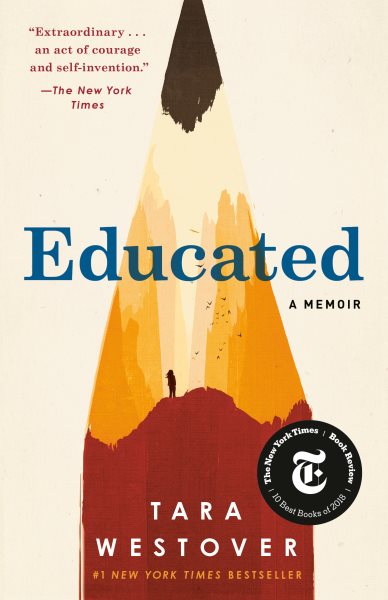Contains spoilers.
This book had a lot of hype, so it didn't live up to my expectations. Someone on Facebook said they enjoyed reading it, but didn't think it was that good a book; I feel the opposite. The first half wasn't super compelling to me, but it felt important. It's not that Westover isn't a good writer, because she is. She just had a lot to get through before she became who she is and the story became more, I don't know, present tense? That's not it. I guess the thing is she needed to provide a lot of background so that the reader could truly understand all of the pieces of her.
Westover grew up in a large family, isolated on a mountain, away from school, medicine, any kind of government interference, according to her parents, purported Mormons, but really controlling, violent manipulators, prepping for the day when the system would collapse and their virtue (and stockpiled guns, gasoline, and canned goods) would prevail.
Despite her privations, Westover, and two of her brothers managed to prevail, getting educations--Ph.Ds even, and forging their own paths, but at the cost of the rest of their nuclear family. It wasn't an easy decision, and if I read the memoir right, Westover is still hoping for reconciliation, at least with her mom and non-dangerous siblings. It's the danger thing that's a problem, though, and intense mental health issues. Given the three Westovers' academic success despite poor, or in Tara's case no public education, one has to wonder what their siblings' lives would have held had their parents not been toxic in their fervor.
I had begun to understand that we had lent our voices to a discourse whose sole purpose was to dehumanize and brutalize others--because nurturing that discourse was easier, because retaining power always feels like the way forward.
This revelation comes after Westover has come home from college for the summer and her brother calls her "nigger" because she has soot on her face. She had never heard before about slavery, the Jewish holocaust, or the civil rights movement. "Retaining power always feels like the way forward" struck me as relevant to politics--politicians and corporate/nonprofit/academic administrators.
At one point her father gets excited that another Westover is going to college, calling him a genius and "five times smarter than Einstein ever was." Tara notes that her brother Richard is to be "the Einstein to disprove Einstein."
Westover illuminates the academic for low-income kids:
Curiosity is a luxury reserved for the financially secure: my mind was absorbed with more immediate concerns, such as the exact balance of my bank account, who I owed how much, and whether there was anything in my room I could sell for ten or twenty dollars.
As someone who works in academia, I'm devastated by that reality. You can get the kid to college, but it's hard for them to really be there if they're worried about food and rent all the time. I mean, I knew that, but it wasn't in my gut before. She writes of a trip to Rome she took with friends while studying abroad in Cambridge, and how differently she experienced the city from her companions: subdued, hushed, silenced by the sites. That's not an inappropriate response, perhaps, but for her it was rooted in feeling like she didn't belong, would never belong, always in awe and never able to be comfortable.
And yet, upon earning her history Ph.D. from Cambridge University, the Harvard of England, she recalls an undergraduate professor writing on the board, "Who writes history?" and realizing that now, the answer is Tara Westover.
